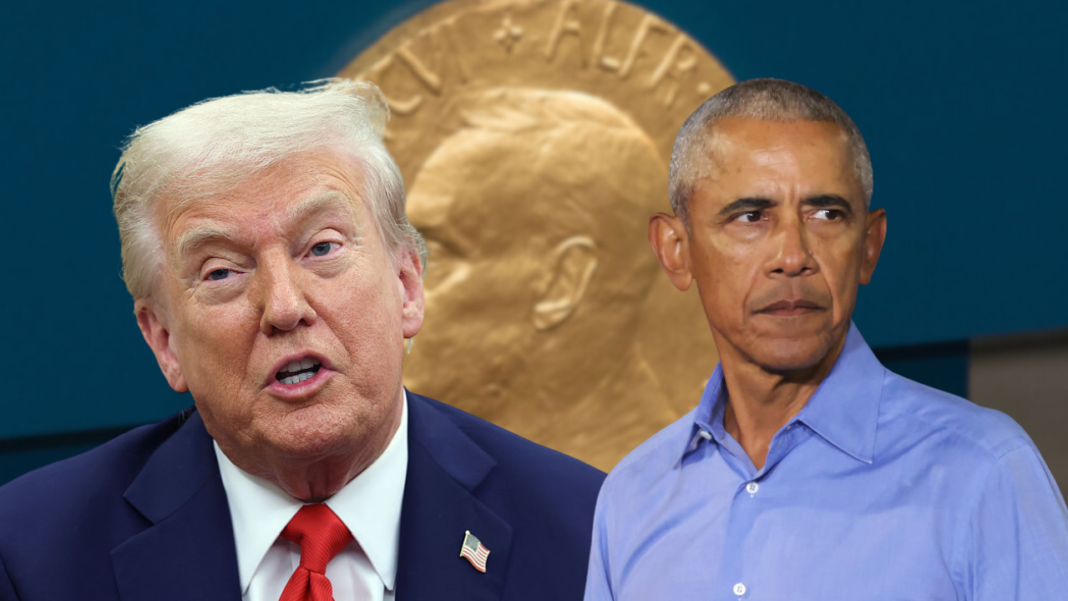Trump’s Nobel Snub: A Political Theatre
After months of public lobbying and self-promotion, President Donald Trump faced a disappointing blow when he did not receive the coveted Nobel Peace Prize. The Norwegian Nobel Institute’s announcement on a Friday morning that Venezuelan opposition leader Maria Corina Machado was the 2025 laureate was seen by Trump’s supporters as a clear snub. For a president long vocal about his own contributions to peace, this outcome was significant.
The Performance of the Prize
Just hours before the announcement, Trump took to the Oval Office to express his grievances, particularly targeting his political nemesis, former President Barack Obama. Trump has consistently criticized Obama’s reception of the Nobel Peace Prize back in 2009, framing it as undeserved and a product of political favoritism. “They gave it to Obama for doing absolutely nothing but destroying our country,” Trump asserted, conjuring a narrative that aligns his presidency with a greater claim to peace efforts.
The Historical Context of the Prize
Obama’s Nobel Prize was awarded less than a year into his presidency, a decision made by the Norwegian Nobel Committee which heralded his “extraordinary efforts to strengthen international diplomacy.” This recognition came amidst a global context of hope for diplomatic relations, particularly with the Muslim world. The stark contrast in reception and reasoning behind the awards draws attention to a broader political narrative surrounding each president.
Responding to the Award Announcement
White House Communications Director Steven Cheung was quick to label the Nobel Committee’s choice, arguing that their decision prioritized “politics over peace.” This sentiment resonates deeply with Trump’s base, who feel that their leader’s diplomatic strategies, particularly the Abraham Accords in the Middle East, have been sidelined in favor of a political agenda that disregards conservative achievements.
Claims of Diplomatic Success
Trump and his administration have made bold claims touting a variety of peace initiatives, including attempts to resolve longstanding conflicts in regions like the Democratic Republic of Congo, Serbia and Kosovo, and improving relations between India and Pakistan. The recent push for a tentative peace deal between Israel and Hamas was even cited as a worthy reason for a Nobel nomination, positioning Trump as a proactive architect of peace.
Criticism from the Opposition
The response from some former Obama staffers has been pointed. Michael Blake, an aide from the Obama administration, expressed that Trump’s obsession with the Nobel Prize stems from jealousy. “Trump is a fascist and he is a weak man who has been jealous of President Obama his entire career,” Blake declared. This critique suggests that the quest for accolades goes beyond mere recognition; it touches on deeper issues of political integrity and ideological transparency.
The Nobel Committee’s Justification
In defending their selection, Norwegian Nobel Committee Chairman Jørgen Watne Frydnes positioned Machado as a “brave and committed champion of peace.” He emphasized that the committee’s secretive deliberations are driven solely by the principles of Alfred Nobel himself, void of political bias. This perspective underscores the committee’s belief that genuine contributions to peace involve integrity and courage, qualities they attribute to Machado’s work amidst complex geopolitical challenges.
Trump’s Continued Advocacy for Recognition
Throughout his presidency, Trump has been vocal about his perceived neglect from the Nobel Committee, suggesting he should have received the award “four or five times.” His assertions reflect a belief that the committee favors liberal candidates, dismissing the merit of his administration’s accomplishments. This ongoing battle for recognition forms a crucial part of Trump’s narrative, where he frames himself as a misunderstood savior of American diplomacy.
The Broader Implications
As discussions continue about the merits and failures of each presidency, the narrative surrounding the Nobel Peace Prize takes on a life of its own. The award, traditionally viewed as an honor, becomes a polarized symbol of political allegiance, reminding us that recognition in the global arena can often reflect more about the broader political landscape than the actual contributions of the individuals involved.
This ongoing saga highlights the intricate interplay of politics, personal ambition, and the quest for legitimacy on both national and international stages. As Trump continues to navigate this tumultuous terrain, the political theatre surrounding the Nobel Peace Prize is sure to remain a focus of fervent debate and analysis.



